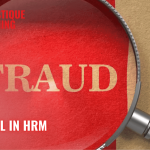Accounting fraud is the deliberate manipulation or misrepresentation of financial information within an organisation's accounting records to deceive stakeholders. This deceptive practice may involve inflating revenues, understating expenses, manipulating asset values, or engaging in other fraudulent activities to present a more favourable financial picture than the true state of affairs.
Detecting accounting fraud is crucial for maintaining transparency and safeguarding the integrity of financial reporting. Several methods can be employed to identify potential fraudulent activities. Regular and thorough internal audits help scrutinise financial transactions, ensuring compliance with established accounting principles. Financial ratio analysis can also reveal inconsistencies or abnormalities in financial statements, prompting further investigation.
Advanced data analytics and forensic accounting techniques should be employed to uncover irregular patterns or anomalies within financial data, providing a more proactive approach to fraud detection. Combining these methods enhances the likelihood of early detection and mitigation of accounting fraud, thereby preserving the trust of investors, regulators, and the wider public.
Upon completion of this course, participants will be able to:
- Explore the framework and underpinnings of financial reporting structures.
- Understand the concept of creative accounting and the methods used to identify it.
- Evaluate the necessity for forensic accounting through case studies and analytical approaches.
- Recognise the significance of Benford’s Law in preventing and detecting fraud.
- Examine the auditor's role in identifying fraudulent activities within financial reporting.
- Implement diverse statistical tests on financial reports and accounting data.
This course is designed for anyone responsible for monitoring and reporting fraud cases within large data systems to protect the wider company. It would be most beneficial for:
- Business Owners
- Directors
- Finance Managers
- Chief Financial Officers
- Data Analysts
- Business Analysts
- IT Consultants
- Accountants
- Risk Assessors
- Auditors
- Project Planners
- Security Leads
This course uses a variety of adult learning styles to aid full understanding and comprehension. Participants will discuss various fraud prevention methods and understand the dangers of security risks through accounting with today’s technology.
They will have the opportunity to discover multiple systems that help uncover errors in data input and conduct exercises based on datasets to understand how fraudulent activity may stand out. Participants will also watch videos and receive information from the trainer regarding risk mitigation and reporting procedures, with templates for conducting and scheduling regular auditing procedures within their organisation.
Day 5 of each course is reserved for a Q&A session, which may occur off-site. For 10-day courses, this also applies to day 10
Section 1: Organising an Internal Audit
- Understanding the basics of internal audits.
- Establishing audit objectives and scope.
- Creating an effective audit plan.
- Conducting risk assessments for internal audits.
- Developing audit programs and procedures.
- Documenting and gathering evidence.
- Interview techniques for internal audits.
- Analysing and interpreting audit findings.
Section 2: Financial Ratio Analysis to Detect Inconsistencies
- Interpreting efficiency ratios.
- Detecting inconsistencies through ratio analysis.
- Common pitfalls in financial ratio analysis.
- Case studies in detecting financial inconsistencies.
- Practical applications of ratio analysis.
- Using financial ratios for decision-making.
Section 3: Auditing Schedules
- Reporting and communicating audit results.
- Implementing corrective actions and recommendations.
- Continuous improvement in internal audit processes.
- Legal and ethical considerations in internal audits.
- Analysing common challenges in auditing schedules.
- Hands-on exercises and case studies.
- Best practices in auditing schedules.
Section 4: Using an Analytical Approach with Technology
- Integration with financial statements.
- Importance of accuracy and completeness.
- Developing a risk-based approach to auditing schedules.
- Role of technology in auditing schedules.
- Statistical models for identifying anomalies.
- Machine learning applications in fraud detection.
- Predictive modelling for proactive fraud prevention.
- Integration of big data in analytical fraud detection systems.
Section 5: Detecting Anomalies
- Time-series analysis for anomaly detection.
- Unsupervised learning techniques in anomaly detection.
- Feature engineering for improved anomaly detection.
- Applications of anomaly detection in cybersecurity.
- Fraud detection using anomaly detection method.
Section 6: Risk Mitigation
- Identifying and assessing risks in different industries.
- Risk management frameworks and methodologies.
- Developing a risk mitigation strategy.
- Importance of proactive risk identification.
- Role of risk assessment in the mitigation process.
Section 7: Fraud Reporting & Next Steps
- Developing internal fraud reporting procedures.
- Encouraging a culture of whistleblowing.
- Protection mechanisms for whistleblowers.
- Communication strategies for reporting fraud incidents.
- Technology tools for secure and confidential fraud reporting.
- Role of internal audit in fraud detection and reporting.
- Investigating reported fraud cases.
Upon successful completion of this training course, delegates will be awarded a Holistique Training Certificate of Completion. For those who attend and complete the online training course, a Holistique Training e-Certificate will be provided.
Holistique Training Certificates are accredited by the British Assessment Council (BAC) and The CPD Certification Service (CPD), and are certified under ISO 9001, ISO 21001, and ISO 29993 standards.
CPD credits for this course are granted by our Certificates and will be reflected on the Holistique Training Certificate of Completion. In accordance with the standards of The CPD Certification Service, one CPD credit is awarded per hour of course attendance. A maximum of 50 CPD credits can be claimed for any single course we currently offer.
- Course Code PF1-142
- Course Format Classroom, Online,
- Duration 5 days














